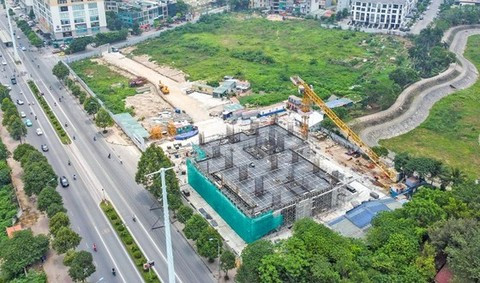
Limited social housing supply, inappropriate loan terms and stringent requirements for borrowers are making disbursement of the VNĐ120 trillion credit package for social housing slow. — Photo sggp.org.vn
The credit package was created following the issuance of the Government's Resolution No 33/NQ-CP in March with a number of solutions to promote the healthy and sustainable development of the property market.
It is equivalent to 12 per cent of the funding needed to achieve the target of building at least one million houses and workers’ dwellings in 2021-30.
The package offers loans on easy terms to developers and buyers of social housing at interest rates that are 1.5 - 2 percentage points lower than normal through participating banks.
But disbursement has been far slower than expected, with just VNĐ105 billion ($4.3 million) disbursed for a project each in three localities in the eight months, according to the State Bank of Vietnam.
Nguyễn Minh Trí of the board of directors of the Vietnam Bank for Agriculture and Rural Development (Agribank), one of the participating banks, said his bank had earmarked VNĐ30 trillion at interest rates sometimes even 2 percentage points below market rates.
The bank had not disbursed many loans, but was ready to lend to businesses that meet legal conditions, he said, noting that two projects in HCM City were completing procedures to borrow.
Hà Thu Giang, head of SBV’s Credit Department, said the slow progress was due to several factors, including limited social housing supply and inappropriate loan terms.
So far 23 out of the country’s 63 cities and provinces had submitted lists of participating projects, she said.
Speaking at a seminar on "Resolving legal problems for the real estate market" in HCM City earlier this month, economist Cấn Văn Lực said disbursement was tardy because interest rates were still high for buyers.
Lê Hoàng Châu, chairman of the HCM City Real Estate Association, said one of the reasons leading to the slow disbursement was that the interest rate was fixed only for the first three years for developers and five years for home buyers before it would become a floating rate, something neither developers nor buyers prefer.
Võ Minh Hoàng, general director of the HCM City Social Housing Corporation, said few developers built social housing and those who do were facing difficulties getting loans from the package.
Some also faced difficulties with acquiring land despite having adequate resources and being willing to participate in the programme, he said.
The comparatively low 10 per cent profit margin in social housing, though it would take longer to complete a project than a commercial one was much more difficult, dissuaded many developers despite the high demand, he added.
Delegates at the seminar quoted property firms as saying 70-80 per cent of the difficulties they face were legal.
So, to develop social housing and disburse the credit package, the Government and localities needed to address the legal issues, make clear zoning plans and provide lands with clear titles, they added.
Lực said Việt Nam needed to have a social housing development fund and mobilise foreign investments.
"Countries such as Singapore and South Korea have such funds operating effectively with interest rates at half the market rates," he said. — VNS